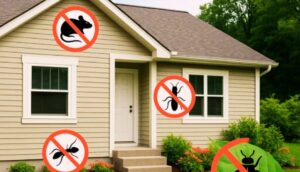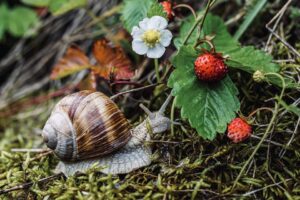11 Ways to Use Diatomaceous Earth in the Garden

Diatomaceous earth is organic non-toxic and is a great way to control garden insect pests and other crawling insects this naturally occurring substance makes DE a must-have. Diatomaceous earth is a type of powder made from the sediment of fossilized algae found in bodies of water, such as streams, and lakes. rivers, and ocean beds. The cells of these algae were found to be high or have an abundance of a compound called silica. The dried sediment that is produced from fossils is said to be rich in silica.
Diatomaceous earth can also be used in edible gardens (Food-grade DE is safe for your garden) which makes DE a must-have, besides controlling garden insects we will be looking at other ways this natural substance can be of benefit in the garden.
Warning: Before applying DE make sure that you are wearing the right safety gear, (safety goggles, gloves, long sleeve shirt, pants, and a mask). DE if inhaled can cause lung and skin irritation
1. Keeping snails and slugs at bay
Snails and Slugs can do a lot of damage to garden plants, these garden pests are known to consume entire herbaceous plants. Snail baits are great for eliminating or keeping snails and slugs at bay. Eggshells are also effective in keeping snails and slugs away, once the shells are broken up and sprinkled around garden plants their jagged edges will deliver painful cuts to their bodies. But Diatomaceous earth can rid your garden of snails and slugs also, apply diatomaceous earth in a circle around garden plants. When the snail or slug comes into contact with this powdered substance it will dry their bodies out causing dehydration followed by death.
2. DE is offensive to rodents
Rats, moles, rabbits, and mice are uninvited guests that will damage garden plants. Not to worry however because DE is on the job and will go to work for you. In small containers or jars place a bit of diatomaceous earth along with a few drops of citrus essential oils or peppermint. Placing these containers or jars throughout your garden will keep rodents out because they find the odor to be offensive and will stay clear.
3. Potting soil
Make soil improvements, DE is lightweight and porous, mixing a few drops will improve air circulation around the plant’s roots and also increase the soil drainage.
4. Compost pile
If you notice maggots in your compost pile and are tempted to use chemicals to get rid of them then think again, what you don’t want is to contaminate your compost. The key to getting rid of maggots while keeping your compost pile contaminated-free is dusting your compost pile with DE. Diatomaceous earth will dry out the bodies of maggots eliminating them.
5. Ants
Ants can become a nuisance, especially fire ants which can deliver a painful sting, to get rid of ants simply dust anthills and the surrounding areas with Diatomaceous earth which will cause ants to pack up and ship out.
6. Preserve cut flowers
Fresh-cut flowers can make a world of difference in an indoor or outdoor environment such as floral arrangements or potted plants placed on patios, decks, porches, or a balcony, the key to preserving your cut flowers so they can stay fresh a bit longer is mixing in diatomaceous earth.
7. Control gnats and fruit flies
Fruit flies and gnats can become an eyesore, these insects love to hover over damp soil, overripe fruits, or potted plants. The solution is to simply sprinkle or dust fruits, damp soil, or potted plants with diatomaceous earth. This will dry out their bodies causing death.
8. Use DE as a deodorizer
Cats and dogs are curious and love to be outdoors wandering in garden areas, their poop can be unpleasant. Mixing DE into the top few layers of soil or just liberally sprinkling it over the soil surface will act as a deodorizer.
Note: Diatomaceous earth can also be applied as a spray solution, mix it with water, and apply it to a sprayer to get hard-to-reach places, like the undersides of plant leaves. DE is only effective when dry, wet applications will begin to work against garden insect pests once extra moisture evaporates or dries.
9. Control Indoor Plant Pest
DE can be used indoors on potted plants to control insect pests for example spider mites, mealybugs, thrips, and other indoor pests. Simply take your potted plants outdoors in a shaded area away from the direct sun and sprinkle lightly with DE. Once done indoor plants can be returned.
10. Use DE as a Barrier
Sprinkle DE in an unbroken cycle around individual plants or garden plants including plant beds, with the use of a duster or DE applicator to control insect pests.
11. Use DE as a Barrier Against Household Pests
Sprinkle DE around window frames, doors, potting sheds, garages, etc.. to keep ants out of your home. Follow the manufacturer’s directions for the best results and make sure that kids and pets are not around when applying to avoid inhaling DE dust.
Note: Heavy rain can wash away DE it is important to reapply DE after rain falls and as long as no rain is forecast.
Warning
Avoid inhaling diatomaceous earth because it can irritate your nasal passage, inhaling large amounts may cause shortness of breath or coughing. DE may also cause eye irritation, skin dryness, and irritation. For the best results follow the manufacturer’s direction.
10 Frequently Asked Questions (FAQs)
1. What exactly is diatomaceous earth, and how does it work?
Diatomaceous earth (DE) is a natural powder made from fossilized remains of tiny aquatic organisms called diatoms. It works by physically damaging the exoskeleton of insects. Once they come in contact with it, the powder dries them out and they die from dehydration. No chemicals involved—just nature doing its thing!
2. Is diatomaceous earth safe to use around pets and kids?
Yes, food-grade diatomaceous earth is generally safe to use around pets and children when used properly. Just avoid creating clouds of dust and make sure they don’t inhale it or ingest large amounts. Always check the label and follow safety instructions.
3. How do I apply diatomaceous earth indoors for pests?
Simply sprinkle a thin layer in areas where you’ve seen bugs—along baseboards, under appliances, behind furniture, in cracks and crevices, and near entry points. Leave it for a few days, then vacuum up the dead insects and reapply as needed. Less is more; a fine dusting works better than clumps.
4. Can I use diatomaceous earth in the garden?
Absolutely! You can dust it on leaves, around the base of plants, or directly on soil to fight off ants, beetles, aphids, slugs, and other garden pests. Just be mindful not to overuse it near flowering plants where pollinators like bees might land.
5. How long does it take for diatomaceous earth to kill insects?
It typically takes about 24 to 72 hours for DE to kill insects after they come into contact with it. The powder doesn’t work instantly, but it’s very effective with a little patience.
6. What kind of pests does diatomaceous earth kill?
DE is effective against a wide range of pests including ants, cockroaches, fleas, bed bugs, earwigs, silverfish, spiders, and many garden insects. It works on any insect with an exoskeleton—just not on rodents or soft-bodied pests like worms.
7. Does diatomaceous earth lose effectiveness when wet?
Yes, moisture reduces its effectiveness. DE needs to stay dry to work properly because it kills insects by drying them out. If you’re using it outdoors, reapply after it rains or if the area gets wet.
8. How much diatomaceous earth should I use?
You only need a light, even coating—just enough to create a dusty layer. Piling it up won’t make it work faster and might actually deter pests from walking through it. A little goes a long way!
9. Can I use diatomaceous earth to get rid of fleas on my pets?
You can use food-grade DE to help control fleas, but never apply it directly on your pet without vet approval. Instead, sprinkle it on pet bedding, carpets, and floors, let it sit for a few hours, then vacuum thoroughly. Repeat every few days during an infestation.
10. Is there a difference between food-grade and pool-grade diatomaceous earth?
Yes—a big one. Food-grade DE is safe for household and garden use, while pool-grade DE is chemically treated and can be harmful if inhaled or ingested. Always choose food-grade for pest control, especially indoors or around people and pets.
Conclusion
Diatomaceous earth has so many benefits in the garden. This all-natural substance is a gardener’s dream of getting rid of many issues that plague garden plants. Don’t hesitate but reach for DE and give it a try, you will see firsthand the amazing results you will get as you seek to win the war on garden insect pests and also to solve other garden issues.









